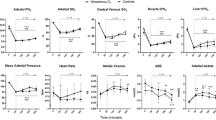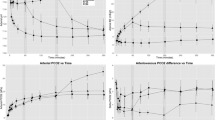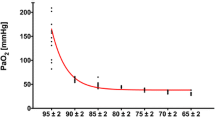Abstract
Objectives.
To evaluate the protection afforded by trans-sodium crocetinate against dysoxia in an animal model of recurrent sub-diaphragmatic ischaemia.
Design.
Prospective experimental animal study.
Setting.
University research laboratory
Subjects.
Adult male Sprague-Dawley rats.
Interventions.
Twelve adult male Sprague-Dawley rats (340–510 g) were anaesthetised with sodium pentobarbitone 60 mg/kg i.p. and ventilated with oxygen and isoflurane via tracheostomy. Six 2-min episodes of sub-diaphragmatic hypotension (mean pressure 30 mmHg) were induced using a sling around the proximal aorta. Before the third and sixth episodes, saline 1.5 ml/kg was injected into the aortic cannula. In six rats, this saline contained trans-sodium crocetinate 50 μg/ml.
Measurements and main results.
Ileal luminal PCO2 and distal aortic pressure were monitored continuously. Following ischaemic episodes trans-sodium crocetinate had no discernible effect on either degree of PCO2 elevation or the time to peak PCO2. No effects on renal energy charge or nucleotide concentrations were detected. UV-visible spectroscopy of the crocetinate preparation showed that some cis isomer was present.
Conclusions.
The findings, although limited to one drug dosage in one animal model, bring into question whether trans-sodium crocetinate affects plasma oxygen diffusivity in vivo. Alternative explanations for the negative findings include a TSC-induced exacerbation of arterio-venous oxygen shunting, the brevity of the dysoxic episodes, and the presence of cis isomer.

Similar content being viewed by others
References
Gainer JL, Rudolph DB, Caraway DL (1993) The effect of crocetin on haemorrhagic shock in rats. Circ Shock 41:1–7
Roy JW, Graham MC, Griffin AM, Gainer JL (1998) A novel fluid resuscitation therapy for haemorrhagic shock. Shock 10:213–217
Giassi LJ, Gilchrist MJ, Graham MC, Gainer JL (2001) Trans-sodium crocetinate restores blood pressure, heart rate, and plasma lactate after hemorrhagic shock. J Trauma 51:932–938
Singer M, Stidwell RP, Nathan A, Gainer JL (2000) Intravenous crocetinate prolongs survival in a rat model of lethal hypoxaemia. Crit Care Med 28:1968–1972
Morgan TJ, Venkatesh B, Endre ZH (1997) Continuous measurement of gut luminal PCO2 in the rat: responses to transient episodes of graded aortic hypotension. Crit Care Med 25:1575–1578
Cross M, Endre ZH, Stewart-Richardson P, Cowin GJ, Westhuyzen J, Duggleby RG, Fleming SJ (1993) 23Na-NMR detects hypoxic injury in intact kidney: increases in sodium inhibited by DMSO and DMTU. Magn Reson Med 30:465–475
Schacterle GR, Pollack RL (1973) A simplified method for the quantitative assay of small amounts of protein in biologic material. Anal Biochem 51:654–655
Atkinson DE (1968) The energy charge of the adenylate pool as a regulatory parameter. Interaction with feedback modifiers. Biochemistry 7:4030–4034
Britton G, Liaaen-Jensen S, Pfander H (1995) Carotenoids, vol. 1A. Birkhauser, Basel
Wagner PD, Hsia CCW, Goel R, Fay JM, Wagner HE, Johnson JR (2000) Effects of crocetin on pulmonary gas exchange during hypoxic exercise. J Appl Physiol 89:235–241
Acknowledgements.
The authors would like to thank Professor J.L. Gainer, Department of Chemical Engineering, University of Virginia, Charlottesville, Va., USA, for assistance with UV-visible spectroscopy and for helpful discussions.
Author information
Authors and Affiliations
Corresponding author
Additional information
The above work was performed in the University of Queensland Intensive Care Laboratories, Royal Brisbane Hospital
Rights and permissions
About this article
Cite this article
Morgan, T.J., Venkatesh, B., Crerar-Gilbert, A. et al. Sodium crocetinate does not alter gut hypercapnic responses or renal energy stores during transient sub-diaphragmatic ischaemia. Intensive Care Med 29, 652–654 (2003). https://doi.org/10.1007/s00134-003-1641-2
Received:
Accepted:
Published:
Issue Date:
DOI: https://doi.org/10.1007/s00134-003-1641-2




